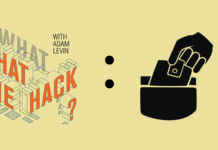

Was it excessive exuberance? Was it judgmental deficiency? Was it the thrill of hearing a barnburner by the President of the World? Well, whatever it was, it was a dangerous mistake.
Wednesday night at the Democratic National Convention, during a particularly rousing segment of President Clinton’s forceful and unabashed dissection of the Republican depiction of Obamacare as a destroyer of Medicare, an enthusiastic Democratic Delegate waved her Medicare card in front of a national news pool camera. The problem is that anyone sharing the moment either online or on television, or researching a replay of that moment, had or will have the opportunity take a long, slow look at a cornucopia of her personal identifying information and be in a position to use it for nefarious purposes.
At the very least, the video offers would-be thieves the opportunity to retrieve her name and her Medicare identification, which also happens to be her Social Security Number. While that may well be enough to begin the identity theft process, they need only go to a variety of other sources to acquire additional personal information to have a more complete picture of the victim.
I can totally understand the emotion of the moment, but that minor burst of unmitigated joy carries with it the possibility of weeks, months, if not years of personal pain and life disruption. But there’s a problem that lies deeper than just this moment of bad judgment; in fact, this brief flash of television footage underscores a huge problem for all card-carrying Medicare recipients — that they are essentially sitting targets for identity theft, whether they wave their card in front of the world, or if the card otherwise leaves their possession. Consumer advocates have railed for years against the dangers of using SSNs as an identifier for other purposes, and of the display of SSNs on any card that you must carry with you — simply because it greatly amplifies consumers’ risk for identity theft. The Government Accountability Office recently called for the removal of SSNs from Medicare cards, but until that actually happens, Medicare recipients will be left to fend for themselves on this one.
With all of the information floating around the brick and mortar, as well as the cyber world about us, combined with the hundreds of millions of files that have been improperly accessed since 2005 due to a pandemic of data breaches, there is little doubt that each of us will suffer some form (if not multiple forms) of identity theft during our lifetime.
Therefore, we need to create a paradigm shift in the way we see the crime and our continuing exposure to it. There are three distinct phases:
1. Limit your risk of exposure: That means don’t carry either your — or your child’s — Social Security card in your wallet. Limit the number of debit and credit cards you leave home with (and always keep a record of the contact information in a safe place). Don’t provide personal information to people you don’t know by phone, in person or online. Use the most sophisticated security software on your computer, iPad and smart phone, and update it as much as possible. Shred all documents you no longer want or need which contain your sensitive data. Beware of phishing email (spear and well as general). Be careful as to the links you click, or pictures you open, even if you think you know the person. Never send money to people you don’t know or money to people you do know, unless they specifically ask you verbally. Do not respond to texts telling you to call numbers that look (and will sound) official because you might be talking to Ivan and not Peggy in customer service or card security. Use strong passwords on all of your apps (alpha numeric not stupid Like your birthdate), and don’t share them among sites. Always spell the URL of every site you visit properly.
2. Either enroll in a credit and public records monitoring program, or establish a set of personal protocols that require you to review your credit reports and Social Security Earnings Statements at least annually, your bank and credit card accounts daily and your Explanation of Benefits from your health insurer as appropriate. Also sign up for email and text notification programs with your financial institution, which alerts you to activity in your account — in many cases in real time.
3. Check with your insurance agent, your account rep at your bank or credit union, your HR department at work, or Student Services at your university to find out if they have a damage control program that can help you navigate the nightmare of an identity theft in the event you become a victim. Several insurance companies offer assistance to their home and auto policyholders; banks and credit unions have them for their depositors and members; Employee Assistance Programs provide help in a bundle of benefits and institutions of higher learning protect their students; faculty or staff as a perk of your relationship with them. Others charge various fees for different levels of service. You can check with the Consumer Federation of America as well as various other organizations to get specifics, as well as reviews of various programs.
Bottom line here — it doesn’t matter how many laws exist, or how vigorously they are enforced — your identity is your asset. No one has a greater stake in protecting your financial security than you do. And, the ultimate guardian of the consumer is the consumer.
It’s good to be enthusiastic about a candidate and a cause. It’s bad to wave personal identification cards in front of cameras.
Originally posted at the Huffington Post.









